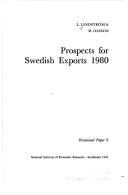| Listing 1 - 7 of 7 |
Sort by
|
Multi
ISBN: 9172100605 Year: 1974 Publisher: Uppsala Svenska Vaxtgeografiska Sallskapet
Abstract | Keywords | Export | Availability | Bookmark
 Loading...
Loading...Choose an application
- Reference Manager
- EndNote
- RefWorks (Direct export to RefWorks)
Plant ecology. Plant sociology --- Phytogeography --- Sweden: South --- Plant-soil relationships --- Sand dune plants --- Soils
Book
ISBN: 9175197790 Year: 2012 Publisher: Linkopings Universitet
Abstract | Keywords | Export | Availability | Bookmark
 Loading...
Loading...Choose an application
- Reference Manager
- EndNote
- RefWorks (Direct export to RefWorks)
Book
ISBN: 9004410368 Year: 2019 Publisher: Leiden Boston : BRILL,
Abstract | Keywords | Export | Availability | Bookmark
 Loading...
Loading...Choose an application
- Reference Manager
- EndNote
- RefWorks (Direct export to RefWorks)
In Jesus for Zanzibar: Narratives of Pentecostal (Non-)Belonging, Islam, and Nation Hans Olsson offers an ethnographic account of the lived experience and socio-political significance of newly arriving Pentecostal Christians in the Muslim majority setting of Zanzibar. This work analyzes how a disputed political partnership between Zanzibar and Mainland Tanzania intersects with the construction of religious identities. Undertaken at a time of political tensions, the case study of Zanzibar’s largest Pentecostal church, the City Christian Center, outlines religious belonging as relationally filtered in-between experiences of social insecurity, altered minority / majority positions, and spiritual powers. Hans Olsson shows that Pentecostal Christianity, as a signifier of (un)wanted social change, exemplifies contested processes of becoming in Zanzibar that capitalizes on, and creates meaning out of, religious difference and ambient political tensions.
Christianity and other religions --- Islam --- Islam. --- Relations --- Christianity. --- City Christian Center (Zanzibar) --- Tanzania --- Zanzibar --- Religion.
Book
ISBN: 9789175197791 Year: 2012 Publisher: Linkopings Universitet
Abstract | Keywords | Export | Availability | Bookmark
 Loading...
Loading...Choose an application
- Reference Manager
- EndNote
- RefWorks (Direct export to RefWorks)
This book presents a comprehensive study on stage T1 urinary bladder carcinoma (UBC) based on a population-based cohort from the Southeast Healthcare Region in Sweden. The research investigates factors involved in tumor development and progression, aiming to identify prognostic markers for recurrence and progression in patients with primary T1 urothelial carcinoma of the bladder. The study utilizes archived tumor tissues and conducts various analyses, including light microscopy, immunohistochemistry, and genetic testing. Key findings include a high recurrence rate of 80% and a progression rate of 39%, with tumor infiltration and p16 staining identified as significant factors for tumor progression. The book is intended for medical professionals and researchers in oncology and pathology.
Book
Year: 1983 Publisher: Stockholm GFF
Abstract | Keywords | Export | Availability | Bookmark
 Loading...
Loading...Choose an application
- Reference Manager
- EndNote
- RefWorks (Direct export to RefWorks)

ISBN: 9138031256 Year: 1976 Publisher: Stockholm National institute of economic research
Abstract | Keywords | Export | Availability | Bookmark
Book

ISBN: 9781474482998 1474482996 Year: 2024 Publisher: Edinburgh : Edinburgh University Press,
Abstract | Keywords | Export | Availability | Bookmark
 Loading...
Loading...Choose an application
- Reference Manager
- EndNote
- RefWorks (Direct export to RefWorks)
Explores the relationship between Muslim communities and the State in East Africa in political, institutional and legal contexts Focuses on the relationship between Muslims and the State in Kenya and Tanzania Asks which factors, both within and outside the Muslim community, shape and affect this relationship in contemporary times Presents 13 case studies exploring governance issues within and across the categories of politics, institutions and law in Kenya and Tanzania Identifies cross-cutting issues of governance and Muslim communites which are relevant beyond East AfricaRecent studies of Muslims in Kenya and Tanzania have tended either to examine governance of Muslims in relation to security issues, or to discuss the reforms attempted within communities and their implications for Muslim theology, rituals and general welfare. Both these approaches are covered in this book, and a third is added – the study of Muslims as citizens or residents of their respective countries, looking at their activities and attitudes in relation to the various challenges they face together with their fellow compatriots and citizens.Featured Case Studies Self-governance and the Lodwar Islamic Centre in Turkana State, Kenya Coastal Muslims and the Kenyan State Citizenship and belonging in the Kenyan Muslim counter-radicalisation programme Muslim publics in postcolonial Kenya The political roles of Islam in postcolonial Tanzania Lived Islam and Muslim Public discourse in Zanzibar, 1984 to the present Inter-religious discourse and Muslim ways of being in Zanzibar SUPKEM – the Supreme Council of Kenya Muslims Muslim networks in post-socialist Tanzania The role of shehes in public health governance in rural Tanzania The Lamu Port project and its effect on local Muslim communities
| Listing 1 - 7 of 7 |
Sort by
|

 Search
Search Feedback
Feedback About UniCat
About UniCat  Help
Help News
News